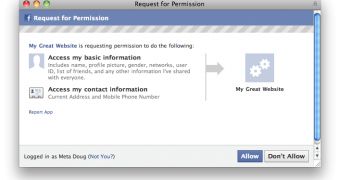Facebook doesn't really have a record of worrying about privacy issues. It's right to take this approach some times, users don't always know 'what's best' for them. Other times, it seems it's taking it one step too far, though it hasn't really affected the site so far.
The latest move that's bound to stir quite a lot of controversy is the addition of mobile phone number and home address information to the contact data app makers can ask for.
Users have to allow apps to access the data, but the request is bundled with the rest of permission requests, which few people actually read any way. It's very likely that people will click allow on anything, just to get to the app they want.
The fact that Facebook revealed the changes only on its developers blog in a post on Friday evening only makes things worse as many are wondering whether this was a deliberate move to have the new feature announcement fly under the radar. It's hard to fly under the radar when you're a company worth $50 billion and with a reported 600 million users, though.
"We are now making a user’s address and mobile phone number accessible as part of the User Graph object. Because this is sensitive information, we have created the new user_address and user_mobile_phone permissions," Facebook's Jeff Bowen announced.
"These permissions must be explicitly granted to your application by the user via our standard permissions dialogs," he explained.
In a perfect world, users would read the permissions notification and would only allow access to an app they trusted. Also in a perfect world, app makers would not request this type of data unless it could be used to provide a better service or product.
Unfortunately, in the real world, Facebook scams are on the rise and it doesn't look like the trend is reversing any time soon. And users are known to have little patience with reading 'the fine print.'
While access to mobile phone numbers or address could prove valuable for businesses and users alike, for example for deliveries, local services and so on, the data could easily be abused, at the very least for spammy text messages.

 14 DAY TRIAL //
14 DAY TRIAL //